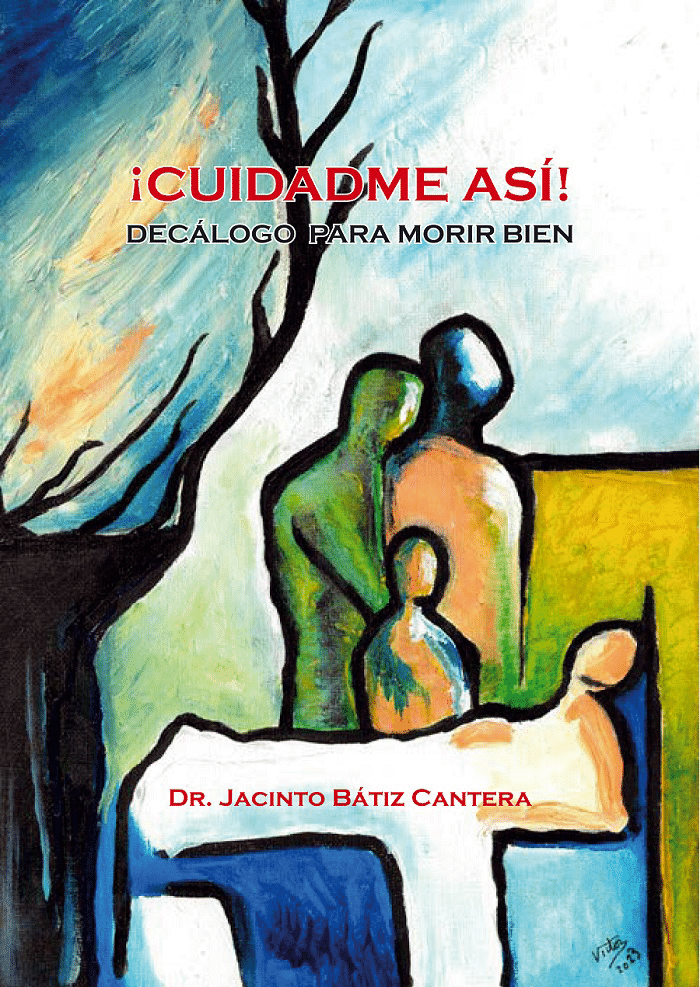Take care of me like this! Decalogue for dying well
A comprehensive guide by Jacinto Bátiz to offer humanized and dignified palliative care at the end of life

In the book, Take care of me like this! Decalogue for dying well, its author Jacinto Bátiz, director of the Institute for Better Care of the San Juan de Dios Hospital in Santurce, states that “I intend to share how I want this care to be when I need it, based on what I learned during the many years in which I accompanied patients in the terminal phase”; that is, to share the lessons of a life dedicated to palliative care and which has had the best teachers, sick people.
Bátiz summarises the Decalogue in the following points:
1. “Treat me like a person”
“Do not see me only as a biological structure, but also take into account my emotional, social and spiritual dimension” (Bátiz, 2024: 17). It is not enough to relieve pain and any other symptoms… And we must not forget who cares, the family. “I think we were very well-trained to treat diseases, but with many shortcomings in treating sick people” (Bátiz, 2024: 18). This must be taken into account not only in the case of incurable diseases. When one is reaching the end, there are four fundamental needs that health professionals have to identify and satisfy:
a) Relief of symptoms that cause physical suffering.
b) Emotional support.
c) Company, people have the right not to die alone.
d) Spiritual support (the most unknown). At that moment, questions of the type arise strongly: “Why me? Why keep fighting? What is the point of my life now that I feel ill? What is God’s role in all this, why doesn’t he do anything to stop this illness? Is there anything after death?” (Bátiz, 2024: 24).
2. “Let me express my feelings”
The fear of death is a deeply rooted emotion in people. The sick person must be allowed to express themselves without interruptions, to share their thoughts and emotions, to vent whenever they want. Likewise, their questions and doubts must be answered realistically.
3. “Let me participate in decisions about my care”
“I wish you would not exercise the paternalism of yesteryear with me, but that you would not fall into autonomist obstinacy either. I know that I have the right to my autonomy, but, if you really want to help me, discuss with me the decisions that are going to be made; That is, I want you to really help me with shared autonomy” (Bátiz, 2024: 37). In order for our opinions to be taken into account, it is advisable to put in writing how we want to be cared for at the end of life, or at least express it to those who will care for us at that time. The Advance Directives Document, Document of Prior Instructions or, colloquially, Living Will is legally binding when it is correctly completed and registered (for more information see Basque Government, 2024).
4. “Do not let me die alone”
“The essential thing in the process of accompanying is not to leave alone those who do not want to be alone. It is of the utmost importance that the dying do not feel abandoned; in other words, that they feel that they are being cared for by others, even if they are aware that they have no cure. I want you to respect my sought solitude and free me from forced solitude” (Bátiz, 2024: 46). The dying person needs to know that they are accompanied by health professionals, family and friends. Company is comforting, loneliness increases the pain. Families with a person admitted to hospital in the terminal phase have three needs (Bátiz, 2024: 52-53):
a) Family readjustment in the time spent caring for the sick person.
b) Time to manage all the resources.
c) Money. To respond to this, it is necessary for health professionals, psychologists, social workers, volunteers, etc. to take action. “Abandonment and therapeutic obstinacy are the two extremes of medical malpractice in end-of-life care, which constitute a serious violation of the Code of Medical Ethics” (Bátiz, 2024: 60). [See OMC, 2022]
5. “When I ask you, don’t deceive me”
“A person, even if sick, has the right to know what is happening to him or her, the right to make decisions and the right to have his or her dignity respected” (Bátiz, 2024: 65). Many people sense the seriousness of their situation and ask for their doubts to be clarified. They must be told, gradually and based on what they know, the truth that they can understand, assume and accept. And attention must be paid to the psychological reaction upon receiving the information. Sometimes the family asks the health personnel to participate in a “conspiracy of silence”, but it must be clear that the ethical obligation is to the sick person, not to the family.
6. “Do not judge me”
“When the patient is in the clinical situation of terminality, he does not need our advice, he needs our company and our listening. In no case will our accompaniment have the objective of making him change his mind” (Bátiz, 2024: 74). We must know what dignity is for the person who is in that situation, because his dignity belongs to him. “Seeking the maximum benefit for the patient continues to be the basic driving force of medical practice, but the will of the patient must determine the correct direction and the limit of our medical care” (Bátiz, 2024: 77).
7. “Understand me and help me face my death”
“I wish that those who care for me, in addition to being professionally competent, are people close to my needs, are capable of knowing them, understanding them and satisfying them to help me face my death” (Bátiz, 2024: 81). Lack of training in palliative care often leads to three very harmful attitudes, which go against comprehensive care: abandonment, self-sufficiency or fear.
8. “Take care of me as you would like to be taken care of”
We are faced with the golden rule, a basic rule for good coexistence and mutual understanding. In situations of high vulnerability, and illness is one, we are more sensitive to treatment lacking empathy and compassion.
9. “Do not intentionally hasten my death”
“I am not afraid of death, I am afraid of suffering. Although I do not want to die, I already know that it will not be possible, but it may be possible not to suffer. Therefore, I do not want you to intentionally hasten my death, but I do not want you to prolong my agony with useless treatments in a clinical situation of terminality; that you are capable of not starting or withdrawing disproportionate treatments” (Bátiz, 2024: 95). Pain relief is not optional, it is an ethical obligation, but it should not consist of “eliminating the person who suffers.”
10. “Take care of my family to alleviate their pain”
It is important to help the family not develop a morbid grief. The best preventive measure for this is to know that the person has died with dignity, in peace and without pain or suffering.
How important it is to educate ourselves and inform ourselves about the end-of-life process! What a difference it makes, both for the person who is leaving and for those around them, if the person is provided with comprehensive care!
***
References
Bátiz, Jacinto (2008, September 20). Caring with caresses. El Correo.
https://www.elcorreo.com/vizcaya/20080920/opinion/cuidar-caricias-20080920.html
Bátiz Cantera, Jacinto (2024). Take care of me like this! Decalogue to die well. Madrid: San Pablo.
Echaniz Barrondo, Arantza (2014, February 21). Caring with caresses.
https://echanizbarrondo.blogspot.com/2014/02/cuidar-con-caricias.html
Basque Government (2024, June 21). Advance directives.
https://www.euskadi.eus/informacion/voluntades-anticipadas-va/web01-a2inform/es
Living Peace (2016). The Golden Rule.
http://livingpeaceinternational.org/es/el-proyecto/regola-d-oro-2.html
Doctors and Patients (2009, November 11). Members of the OMC, awarded in the VIII edition of the Reflexiones Award.
https://www.medicosypacientes.com/articulo/miembros-de-la-omc-galardonados-en-la-viii-edicion-del-premio-reflexiones
OMC – Spanish Medical Association (2022). Code of Medical Ethics 2022.
https://www.cgcom.es/conocenos/cgcom/comision-de-etica-y-deontologia-medica-de-la-omc
University of Deusto (2024a, February 1). The University of Deusto and the Pía Aguirreche Foundation will work together to promote the values of palliative culture.
https://www.deusto.es/es/inicio/vive/actualidad/noticias/la-universidad-de-deusto-y-la-fundacion-pia-aguirreche-trabajaran-conjuntamente-para-promover-los-valores-de-la-cultura-paliativa/noticia
University of Deusto (2024b, July 24). I Edition of the course “Towards a palliative culture to care for people”.
https://www.deusto.es/es/inicio/vive/actualidad/noticias/i-edicion-del-curso-%E2%80%9Chacia-una-cultura-paliativa-para-cuidar-a-las-personas%E2%80%9D/noticia
 (EN)
(EN)
 (ES)
(ES)
 (IT)
(IT)





